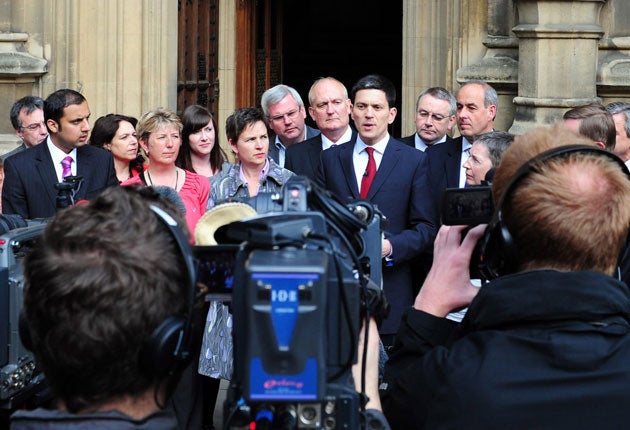Miliband tries to 'move on' from Iraq invasion row
Former foreign secretary's rivals say Blair's 2003 war caused 'catastrophic loss of faith' in Labour

David Miliband attempted to shift the focus of the Labour leadership debate away from the Iraq conflict yesterday, after two of his main rivals criticised the decision to go to war in 2003.
The former foreign secretary, who supported Tony Blair over the hugely controversial invasion, claimed that it was "time to move on" from the war, amid concerns that it would become a divisive issue during the leadership campaign.
The issue was thrust on to the agenda this weekend after two leadership rivals used separate interviews to criticise the decision to go to war, citing the impact it had had on the Labour Party.
Ed Balls, the former schools secretary, said the war was a "mistake". Ed Miliband, David Miliband's younger brother, said that the invasion had resulted in a "catastrophic loss of trust" for Labour.
Mr Balls told The Daily Telegraph: "We shouldn't have changed our argument from international law to regime change in a non-transparent way. It was an error for which we as a country paid a heavy price, and for which many paid with their lives."
Ed Miliband told The Guardian that UN weapons inspectors should have been given more time to find out whether Saddam Hussein had weapons of mass destruction.
The interventions by two men who worked for Gordon Brown when the invasion was ordered immediately revived questions over the former prime minister's then attitude to the war.
But they also propelled David Miliband into the spotlight, as he was a staunch supporter of Mr Blair and voted for the invasion in March 2003. His brother and Mr Balls did not enter Parliament until 2005.
David Miliband responded to their comments by insisting that much of the old controversy had now died away. "While Iraq was a source of division in the past, it doesn't need to be a source of division in the future," he said, as he arrived at the annual conference of the centre-left Progress group in London.
"Iraq was a big issue at the 2005 general election, but the vast majority of MPs and candidates I have spoken to this time say that, while it was a big issue then, it was much less of an issue in 2010. I said, during the election campaign, that I thought it was time to move on."
Asked why his brother and Mr Balls appeared to be trying to use the issue to "score points" within the Labour Party, he retorted: "I think that is something that you would have to ask them about."
The candidates' surprise declarations did not impress others who had made clear their opposition to the war from the start. John McDonnell, a left-winger, who is also standing in the leadership race, welcomed their "road to Damascus conversion" – but said it had come far too late.
The Progress conference at Congress House in central London came only two weeks after Labour had lost the general election. But David Miliband said it felt like "two months".
Jessica Asato, who was the acting director of Progress until last week, said: "I am looking at who is ready to be electable as a prime minister and, for me, that is David Miliband. But it's not like the arguments we have had in the past. People aren't shouting at each other. I've got lots of friends who are supporting Ed."
Emily Thornberry MP, who resisted the Lib Dems in Islington South, said: "I'm out as supporting Ed [Miliband]. I was on the demonstration against the war. I didn't see Ed there, but there were a lot of people." She believes Miliband Jnr would draw younger activists to the party.
When David Miliband finally took to the stage yesterday afternoon, he promised free party memberships and a third of Shadow Cabinet jobs for women. He dodged one question: "If you don't win, who would you like to see as leader?" And he was then told by a man in the crowd that he still hadn't revealed "a big idea". "I've done two days of listening so far, so I'm not going to say exactly what that is just yet," he replied.
Oona King, the former MP for Bethnal Green and Bow who went to the same north London school as the Miliband brothers, said: "If you look at Nick Clegg, being able to speak with a human touch translated into becoming Deputy Prime Minister. The TV debates have changed things and we are moving to where we are choosing leaders who are TV hosts, who will be comfortable with being interviewed on the GMTV sofa. I think it's worrying, but it's something we have to counter."
Join our commenting forum
Join thought-provoking conversations, follow other Independent readers and see their replies
Comments